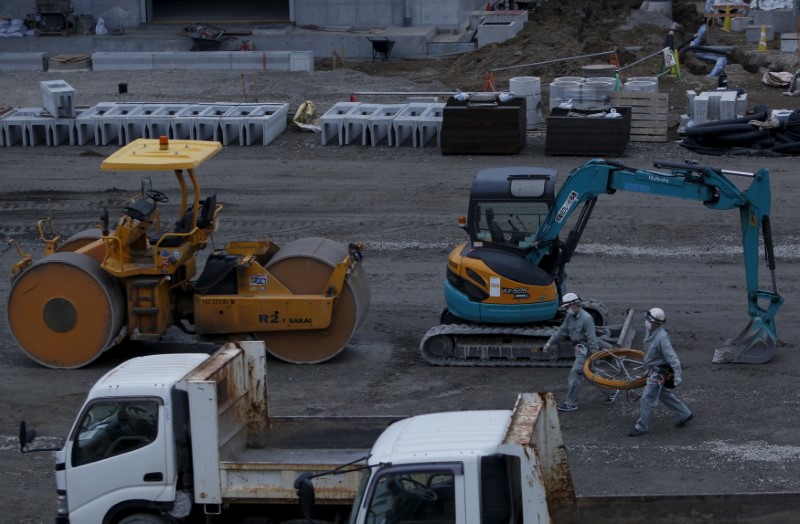By Minami Funakoshi
TOKYO (Reuters) - Japan's core machinery orders unexpectedly tumbled in May on persistent weakness in the services sector, and the government downgraded the outlook for orders for the first time in eight months, raising doubts about the strength of the economic recovery.
The result is also particularly surprising given recent signs of an upswing in momentum. It suggests policymakers will have their work cut out in their quest to foster sustainable growth - especially if businesses show reluctance to invest, though some analysts caution against reading too much into the weak numbers.
Core orders, a highly volatile data series regarded as an indicator of capital spending in the coming six to nine months, dropped 3.6 percent in May from the previous month, Cabinet Office data showed on Monday.
It was the steepest month-on-month decline since August 2016, and sharply undershot the 1.7 percent increase expected by economists in a Reuters poll. In April, they declined 3.1 percent.
Core orders from the services sector fell 5.1 percent, down for a third straight month, dragged by declines in orders from transportation firms for computer systems and railway cars, and from telecommunications and construction industries.
Orders from manufacturers rose 1.0 percent in May from the previous month, up for a fourth straight month, led by gains in orders for turbines and boilers.
The government cut its assessment of machinery orders for the first time since September 2016, saying they are stalling, in a worrying sign businesses may be turning cautious on investing.
"Machinery orders probably won't be very strong (in the coming months)," a Cabinet Office official said.
"We can't say they will significantly worsen, but we don't hear companies saying they will start recovering in July-September," the official said.
Some analysts echoed the government's pessimism.
"The results were extremely weak...There is a high chance core machinery orders will decline for the second quarter in a row (in April-June)," said Koya Miyamae, senior economist at SMBC Nikko Securities, in a note.
Miyamae said it was surprising that orders declined from sectors such as transportation, postal and construction, which have been hit by labor shortages.
PINCH OF SALT
However, some analysts say the Monday's data should be taken with a pinch of salt.
"Machinery orders are volatile...it's better to look at the BOJ tankan in this case," said Hidenobu Tokuda, senior economist at Mizuho Research Institute.
The BOJ tankan, a closely-watched central bank survey, showed that big firms plan to raise their capital spending by 8.0 percent in the current fiscal year to March 2018.
Confidence among Japan's big manufacturers hit its highest level in more than three years in the June quarter, the survey also showed.
Indeed, recent data suggested momentum was picking up, though it wasn't clear if the economic recovery was broadening out, with industrial output falling faster in May than at any time since the devastating earthquake of March 2011.
Japanese policymakers hope capital spending will help revitalize the world's third-largest economy and pull it out of years of deflation and stagnation.
Speaking shortly after the machinery orders results were released, Bank of Japan Governor Haruhiko Kuroda reiterated the central bank's resolve to maintain its massive stimulus program until inflation is stably above its 2 percent target.
He also said inflation is likely to gradually accelerate towards 2 percent reflecting improvements in the economy.

Japan's economy expanded an annualized 1.0 percent in the first quarter on robust exports and household spending, while business confidence hit a three-year high in the three months to June.